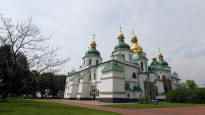The capital of Ukraine, Kiev, is of such great symbolic and historical significance to Russia that it may even be part of the cause of the war.
It is not certain whether it happened in the Crimea or in Kiev. In any case, Christian baptism was performed in more than a thousand years ago, the effects of which are still visible before our eyes.
In 988, the then pagan, Grand Duke of Kiev Vladimir converted to Christianity.
– It is the starting point of East Slavic Orthodoxy, says University Researcher, Doctor of Theology Heta Hurskainen From the University of Eastern Finland in Joensuu.
– Kiev is considered the mother of all Russian cities, says Docent of Russian History at the University of Eastern Finland Kati Parppei.
The history of the baptism of Vladimir Grand Duke of Kiev, according to scholars, is one factor that may explain why Russia has invaded Ukraine.
Great symbolic value
Scholars and war experts quite agree that the Russian president Vladimir Putin wanted to take over Kiev in order to change the leadership of Ukraine to pro-Russian – that is, to oust the President of Ukraine Volodymyr Zelensky.
But Kiev is much more for the Russians than just the capital of Ukraine, say researchers Kati Parppei and Heta Hurskainen.
Russian President Vladimir Putin sees Kiev as such an important part of Russian history that he also wants to return the city to Moscow. The leader of the Russian Orthodox Church, the Moscow Patriarchate Kirill, has the same idea.
Regarding the significance of Kiev, the researcher Kati Parppei does not believe that Russia will bomb the city to the ground, as it has done in Mariupol, for example.
– The symbolic value of Kiev for Russia is so great. It is related to the Moscow idea that both the ancient Russian administrative structure and Christianization and the construction of the church in Russia took shape from Kiev, says Parppei.
This development, which began centuries ago, helps to explain both Putin’s and Patriarchate Kirill’s desire for Kiev and Ukraine.
– Kirill believes that Kiev should be under Moscow, says researcher Heta Hurskainen.
Central power got the grip
When the prince of Kiev, Vladimir, was baptized in 988, there was still no information about the Russian state.
Around present-day Ukraine there was a kingdom called Kievan Rus, also known as Kievan Rus. It stretched at its greatest from the territory of present-day Ukraine to the Arctic Ocean.
The Rusy of Kiev included numerous principalities. Moscow, then, was only a small principality, as was Kiev.
– In 1051, the Kiev Cave Monastery was founded, which is an important spiritual center and reportedly the first monastery in the Rusj region, says Kati Parppei.
As the Mongols conquered the area in the 13th century, the center of power began to shift further north.
The power of the Moscow dynasty grew in the 15th and 16th centuries and they began to write history from their own perspective. They described themselves as heirs to the mantles of Kiev and leaders of the Orthodox Christian Church.
– The principalities around Moscow began to consider the Grand Duke of Moscow their leader. The central power and unity that began then is the red thread that runs from the 15th century to the present day, says researcher Kati Parppei.
According to Parppe, the Russians see that Ukraine is an old Russian state where the East Slavs would have been undivided.
– It’s a Moscow-written history. Ukrainians, on the other hand, see that Ukraine is Ukrainian and place more emphasis on Western connections, says Parppei.
Putin wants to catch the fugitive
In 1988, the then Soviet Union celebrated the great 1000th anniversary of the baptism of Russia and Kiev. They also continued in July 1991, which became independent in 1991.
– After the conquest of Crimea, ie in 2014, the Moscow Patriarch has not had an issue with Ukraine, says researcher Heta Hurskainen.
Patriarch of Moscow Kirill has openly stated its acceptance of Russia ‘s invasion of Ukraine, which has caused great surprise both in Finland and elsewhere in the Orthodox world.
For university researcher Heta Hurskainen, the actions of Patriarch Kirill did not come as a surprise. Kirill saw this as an opportunity to bring the various Ukrainian Orthodox back to Moscow.
– The roots of the Moscow Patriarchate are in Kiev and the baptism that took place there more than a thousand years ago, says Hurskainen.
Kati Parppei explains how Putin in 2014 stated that Crimea is the spiritual source of a unified Russian state and a centrally led Russian kingdom. By this, Putin was referring to the Christian baptism of the Grand Duke of Kiev, Vladimir.
– Vladimir Putin sees Ukraine as a threat from Moscow’s sphere of influence. The same is true of the Russian Orthodox Church, which fears that Ukraine will leave the sphere of influence of the Moscow Patriarchate, explains University Researcher Heta Hurskainen from the University of Eastern Finland.
Although Russia’s main goal in taking over Kiev was to change the political leadership of Ukraine to its liking, Kati Parppei believes that the historical significance of Kiev is one, albeit secondary, to the current war.
– There is also a deep symbolism in that war that is related to the spiritual significance of Kiev. Putin’s idea is that the fugitive should be brought back to Moscow’s affectionate, sums up Kati Parppei, a docent in Russian history at the University of Eastern Finland.
